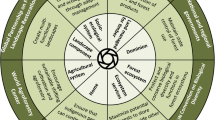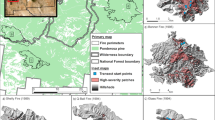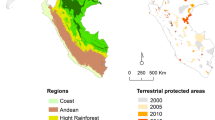Abstract
The incidence of forest dieback in the Northern Hardwoods biome of Canada and the United States was determined for period from 1910 to 1990. Information from annual forest service pathology inventories in the two countries and other published literature was coded to estimate yearly the severity and areal extent of dieback on white/yellow birch and sugar maple from 1910 to 1990. Principal dieback episodes occurred as distinct waves coincident with maturation of the forest population in each of six regions. These episodes endured an average of 11 years. It is hypothesized that, once forest populations are mature, they are susceptible to extreme stresses such as freezing and drought which serve to synchronize the onset and subsidence of major dieback episodes.
Similar content being viewed by others
References
Alexander, S. A. and Barnard, J. E.: 1992,Forest Health Monitoring 1992 Activities Plan, Report EPA/620/R-93/002. Office of Research and Development, United States Environmental Protection Agency, Washington, DC U.S.A.
Allen, D. C., Bauce, E. and Barnett, C. J.: 1992, ‘Sugar Maple Declines — Causes, Effects, and Recommendations’, in P. D. Manion and D. Lachance (eds.),Forest Decline Concepts, The American Phytopathological Society (APS) Press, St. Paul, Minnesota, U.S.A., pp. 123–136.
Auclair, A. N. D.: 1993, ‘Extreme Winter Temperature Fluctuation, Root and Sapwood Injury, and Oak Dieback in Central Europe’, in N. Luisi, P. Lerario, and A. Vannini (eds.),Recent Advances in Studies on Oak Decline, Proceedings of an International Congress at Selva di Fasano (Brindisi), Italy, September 13–18, 1992, sponsored by the International Union of Forestry Research Organizations (IUFRO), and the Academia Italiana di Scienze Forestali, Firenze, Italia. Tipolitografia Radio-Putignano Pres, Bari, Italy, pp. 139–148.
Auclair, A. N. D., Worrest, R. C., Lachance, D. and Martin, H. C.: 1992, ‘Climatic Perturbation as a General Mechanism of Forest Dieback, in P. D. Manion and D. Lachance (eds.),Forest Decline Concepts, The American Phytopathological Society (APS) Press, St. Paul, Minnesota, U.S.A., pp. 38–58.
Auclair, A. N. D., Lill, J. T. and Revenga, C.: 1996, ‘The Role of Climate Variability and Global Warming in the Dieback of Northern Hardwoods’,Water, Air, and Soil Pollut. (in press).
Barter, G. W.: 1953, ‘Evidence of Spread of Dieback as Indicated by Location and Time of Injury’, in Canada Department of Agriculture,Report of the Symposium on Birch Dieback. Summary of the Meetings Held in Ottawa, Canada. March 21–22, 1952. Forest Biology Division, Science Service, Canada Department of Agriculture, Ottawa, Ontario, Canada, pp. 33–41.
Bickerstaff, A. and Hostikka, S. A.: 1977,Growth of Forests in Canada, Part 2. Canadian Forestry Service, Fisheries and Environment Canada, Ottawa, Ontario, Canada, 136 p.
Bormann, F. H. and Likens, G. E.: 1979,Pattern and Process in a Forested Ecosystem, Springer-Verlag, New York, U.S.A.
Braun, E. L.: 1950, Deciduous Forests of Eastern North America. Blakiston Company, Philadelphia, Pennsylvania, U.S.A.
Clark, J. S.: 1988,Nature 334: 233.
Clawson, M.: 1979,Science 204: 1168.
Cramer, H. H. and Cramer-Middendorf, M.: 1984,Pflanzenschutz-Nachrichten Bayer 37(55): 208.
Daviault, L.: 1953, ‘Evidence of Spread or Intensification as Indicated by Location and Time of Injury, in Canada Department of Agriculture,Report of the Symposium on Birch Dieback, Summary of the Meetings Held in Ottawa, Canada. March 21–22, 1952. Forest Biology Division, Science Service, Canada Department of Agriculture, Ottawa, Ontario, Canada, pp. 42–49.
Gagnon, G. and Roy, G.: 1991, ‘Deperissement des Erablieres (Decline in Sugarbushes)’, inInsectes et Maladies des Arbres, Quebec 1990. Forestry Canada, Quebec Region, Sainte Foy, Quebec, Canada, pp. 6–7.
Gagnon, G., Roy, G., Gravel, C. and Gagne, J.: 1986, ‘State of Dieback Research at the Ministere de l'Energie et des Ressources’, inMaple Decline, Maple Producers Information Session, 8 May 1986, Quebec City. Report AGDEX 300/637, Conseil des Productions Vegetales du Quebec and Quebec Ministere de l'Agriculture, des Pecheries et de l'Alimentation, Quebec, Quebec, Canada, pp. 43–80.
Hall, J. P.: 1993,ARNEWS Annual Report 1992, Information Report ST-X-7. Canadian Forest Service, Natural Resources Canada, Ottawa, Ontario, Canada.
Hawboldt, L. S.: 1947,Journal of Forestry 45, 414.
Houston, D. R.: 1981,Stress Triggered Tree Diseases — The Diebacks and Declines, U.S.D.A. Forest Service Report NE-INF-41-81, Northeast Forest Experiment Station, Hamden, Connecticut, U.S.A., 36 p.
Houston, D. R.: 1992, ‘A Host-Stress-Saprogen Model for Forest Dieback-Decline Diseases, in P. D. Manion and D. Lachance (eds.),Forest Decline Concepts, The American Phytopathological Society (APS) Press, St. Paul, Minnesota, U.S.A., pp. 3–25.
Landmann, G., Becker, M., Delatour, C., Dreyer, E. and Dupouey, J. L.: 1993, ‘Oak Dieback in France: Historical and Recent Records, Possible Causes, Current Investigations’, in F. Pfeil (ed.),Zustand und Gefahrdung der Laubwalder. Rundgesprache der Kommission fur Okologie, Bd 5. Munich, Germany, pp. 97–114.
Leith, H.: 1975, ‘Modeling the Primary Productivity of the World’, In H. Leith and R. H. Whittaker (eds.).Primary Productivity of the Biosphere, Springer-Verlag, New York, NY, U.S.A., pp. 237–263.
Lindgren, R. G.: 1994,Carbon Dioxide Flux from Forest Dieback Episodes: An Information Base on Area and Volume of Dieback-Incited Mortality, Task 3 Report to the Office of Research and Development, United States Environmental Protection Agency, Washington DC, May 1994. Science and Policy Associates, Inc., Washington, DC, U.S.A., 21 p.
Manion, P. D.: 1981,Tree Disease Concepts. Prentice-Hall, Inc., Englewood Cliffs, New Jersey, U.S.A., 409 p.
Manion, P. D. and Lachance, D.: 1992, ‘Forest Decline Concepts: An Overview’, in P. D. Manion and D. Lachance (eds.),Forest Decline Concepts. The American Phytopathological Society (APS) Press, St. Paul, Minnesota, U.S.A., pp. 181–190.
McLaughlin, D., Gizyn, W., McIlveen, W. and Kinch, C.: 1992, ‘A Quantitative Tree Crown Rating System for Deciduous Forest Health Surveys: Some Results for Ontario’, in P. D. Manion and D. Lachance (eds.),Forest Decline Concepts. The American Phytopathological Society (APS) Press, St. Paul, Minnesota, U.S.A., pp. 137–154.
Millers, L., Lachance, D., Burkman, W. G. and Allen, D. C.: 1991,North American Sugar Maple Decline Project: Organization and Field Methods. General Technical Report NE-154. U.S. Department of Agriculture, Forest Service, Northeastern Forest Experiment Station, Radnor, Pennsylvania, U.S.A., 26 p.
Millers, I., Shriner, D. S. and Rizzo, D.: 1989,History of Hardwood Decline in the Eastern United States, General Technical Report NE-126. U.S. Department of Agriculture, Forest Service, Northeastern Forest Experiment Station, Radnor, Pennsylvania, U.S.A., 75 p.
Mueller-Dombois, D.: 1989,Annual Review of Ecology and Systematics 17: 221.
Mueller-Dombois, D.: 1992, ‘A Natural Dieback Theory, Cohort Senescence as an Alternative to the Decline Disease Theory’, in P. D. Manion and D. Lachance (eds.),Forest Decline Concepts, The American Phytopathological Society (APS) Press, St. Paul, Minnesota, U.S.A., pp. 26–37.
Pomerleau, R.: 1953, ‘Spreadversus Intensification of Dying in Hardwood Species in Quebec’, in Canada Department of Agriculture,Report of the Symposium on Birch Dieback, Summary of the Meetings Held in Ottawa, Canada, March 21–22, 1952. Forest Biology Division, Science Service, Canada Department of Agriculture, Ottawa, Ontario, Canada, pp. 50–51.
Powell, D. S., Faulkner, J. L., Darr, D. R., Zhu, Z. and MacCleery, D. W.: 1993,Forest Statistics of the United States, 1992. U.S.D.A. Forest Service, Washington, DC, U.S.A.
Rowe, J. S.: 1972,Forest Regions of Canada. Canadian Forest Service, Environment Canada, Ottawa, Ontario, Canada.
Sinclair, W. A.: 1964,Cornell Plantations 20, 62.
USDA Forest Service: 1993a,Estimates of the Geographic Area Occupied by Northern Hardwood Forest Types, Northeastern Region, Forest inventory. Northeastern Forest Experiment Station, U.S. Department of Agriculture, Forest Service, Radnor, Pennsylvania, U.S.A.
USDA Forest Service: 1993b,Estimate of Geographic Area Occupied by Maple-Beech-Yellow Birch Forest, 1983–1990, Northcentral Region, Forest Inventory, North Central Forest Experiment Station, U.S. Department of Agriculture, Forest Service, St. Paul, Minnesota, U.S.A.
USDA Forest Service: 1993c,Estimates of Geographic Area Occupied by Maple-Beech-Yellow-Birch and by Aspen-White Birch Forest Types, 1983–1990, Northcentral Region, Forest Inventory, North Central Forest Experiment Station, U.S. Department of Agriculture, Forest Service, St. Paul, Minnesota, U.S.A.
Walker, S. L., Auclair, A. N. D. and Martin, H. C.: 1990,History of Crown Dieback and Deterioration Symptoms of Hardwoods in Eastern Canada, Parts I, II, and III. Environment Canada, Atmospheric Environment Service, Federal LRTAP Liaison Office, Downsview, Ontario, Canada, 561 p.
Wargo, P. M.: 1994,Decline Disease, Forest Health, and Ecosystem Sustainability, Research Plan 1996–2005. Northeastern Forest Experiment Station, U.S. Department of Agriculture, Forest Service, Hamden, Connecticut, U.S.A.
Author information
Authors and Affiliations
Rights and permissions
About this article
Cite this article
Auclair, A.N.D., Eglinton, P.D. & Minnemeyer, S.L. Principal forest dieback episodes in Northern Hardwoods: Development of numeric indices of areal extent and severity. Water Air Soil Pollut 93, 175–198 (1997). https://doi.org/10.1007/BF02404755
Received:
Accepted:
Issue Date:
DOI: https://doi.org/10.1007/BF02404755




